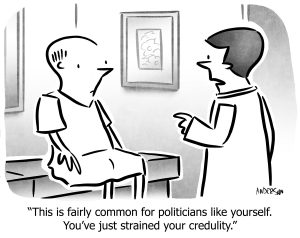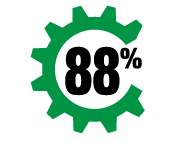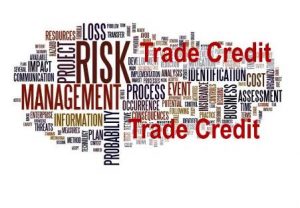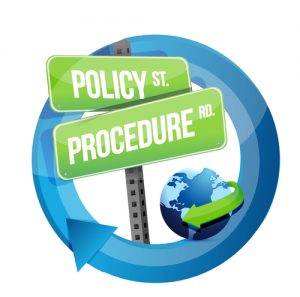 Changes in tax and business regulations that occur due to the political climate at any given time can have a huge impact on businesses and can even be the difference between their success or failure.
Changes in tax and business regulations that occur due to the political climate at any given time can have a huge impact on businesses and can even be the difference between their success or failure.
Because small and mid-sized business are in the front lines of commerce, they’re also among the first in the economy to feel the effects of delayed growth or public policy that’s unfavorable to business owners.
This requires business owners to be keenly aware of how the laws legislators pass will affect them, and it’s also why it’s important for them to be politically active for candidates who are aware of and prioritize the needs of small businesses.
SHARING POLITICAL ASSOCIATIONS …
 However, it’s often best for business owners to keep their political associations private rather than share them on behalf of the business – especially if those political views are particularly alienating to customers.
However, it’s often best for business owners to keep their political associations private rather than share them on behalf of the business – especially if those political views are particularly alienating to customers.
It’s not uncommon for consumers to take issue with businesses who are openly supportive of political candidates or stances they disagree with, which could cause some customers to become biased against your company and even leave you bad reviews online.
 This could negatively impact a business as 88 percent of consumers are influenced by online reviews. Instead of openly criticizing political decisions that are affecting a business, try to be diplomatic about current events if speaking as the business owner.
This could negatively impact a business as 88 percent of consumers are influenced by online reviews. Instead of openly criticizing political decisions that are affecting a business, try to be diplomatic about current events if speaking as the business owner.
A SHARP DRAWBACK …
Due to political prospective in financial institutions, smaller businesses reported that major sources of credit including credit cards and bank loans drew back sharply last quarter, according to results from the Q3 Private Capital Access Index (PCA Index) from Dun & Bradstreet and Pepperdine Graziadio Business School.
 More businesses reported they were unable to secure credit from 14 of 17 lending categories measured including bank loans, credit cards (personal and business), and credit unions.
More businesses reported they were unable to secure credit from 14 of 17 lending categories measured including bank loans, credit cards (personal and business), and credit unions.
The number of businesses that were able to secure a loan from a traditional bank declined 41.5% quarter over quarter, with 31% of businesses reporting that they were successful securing a bank loan as a source of funding compared to 53% the previous quarter.
 Trade credit – a common lending practice in which businesses agree to exchange goods without paying cash up front and the supplier is paid at a later scheduled date – also dropped significantly from 65% of business reporting success in Q2 to 43% reporting success in Q3.
Trade credit – a common lending practice in which businesses agree to exchange goods without paying cash up front and the supplier is paid at a later scheduled date – also dropped significantly from 65% of business reporting success in Q2 to 43% reporting success in Q3.
Successful loans from credit unions also dropped 39.2% from 51% of businesses reporting financing success in Q2 to 31% reporting success in Q3 2019.
DECREASES WITH FIRM SIZE …
 The variance of both profitability and growth decreases with firm size.
The variance of both profitability and growth decreases with firm size.
The second key source of divergence is that smaller enterprises have a lower probability of survival than larger enterprises.
In a normally functioning financial market, some of these differences should be reflected in higher interest rates or less favorable terms of debt financing.
 This general observation, as well as the following points, should be considered in the design of policy responses to the needs of Small and Medium Sized Enterprises (SMEs).
This general observation, as well as the following points, should be considered in the design of policy responses to the needs of Small and Medium Sized Enterprises (SMEs).
> Financial institutions assess smaller and medium enterprises as being inherently riskier.
> Larger firms usually comply with higher disclosure requirements to a greater extent than SMEs because of their access to a broad range of external funds (including bonds, equity and loans). Financial institutions charge higher interest rates to SMEs than to bigger companies in order to compensate for the higher costs of information collection, the smaller volume of external financing and the greater risk of failure.
 > For many existing SMEs “insiders” (the entrepreneur, management) have better information about the expected profits of activities than external financial institutions. This lack of information leads to higher market rates to compensate for risk which may crowd out low risk, low-return borrowers, leaving a relatively higher number of high risk/return borrowers in the market. Charging higher interest rates may therefore not be in the interest of banks as low-risk borrowers — those most likely to repay loans — are driven from the market.
> For many existing SMEs “insiders” (the entrepreneur, management) have better information about the expected profits of activities than external financial institutions. This lack of information leads to higher market rates to compensate for risk which may crowd out low risk, low-return borrowers, leaving a relatively higher number of high risk/return borrowers in the market. Charging higher interest rates may therefore not be in the interest of banks as low-risk borrowers — those most likely to repay loans — are driven from the market.
 > In the case of new enterprises or activities, outsiders (experienced bankers or other specialized financial intermediaries) can, in many cases, better assess the risks involved than relatively inexperienced “insiders”. A specific disadvantage of young firms is that they cannot point to credit histories which provide important signals and help facilitate access to debt financing.
> In the case of new enterprises or activities, outsiders (experienced bankers or other specialized financial intermediaries) can, in many cases, better assess the risks involved than relatively inexperienced “insiders”. A specific disadvantage of young firms is that they cannot point to credit histories which provide important signals and help facilitate access to debt financing.
 > Lending to SMEs is more likely to be based on collateral than is the case for loans to larger firms. This may lead to situations in which lending is not based on expected return but rather upon access to collateral. On the other hand, collateral reduces or eliminates contract problems such as “moral hazard” and “adverse selection”. Many SMEs lacking access to “good collateral” suffer from credit rationing.
> Lending to SMEs is more likely to be based on collateral than is the case for loans to larger firms. This may lead to situations in which lending is not based on expected return but rather upon access to collateral. On the other hand, collateral reduces or eliminates contract problems such as “moral hazard” and “adverse selection”. Many SMEs lacking access to “good collateral” suffer from credit rationing.
WHEN YOU NEED FINANCING …
 Uncertain regulations, changing tariffs, shifting environmental regulations and employment rules and new tax laws, all combine to have impact on small and mid-sized businesses.
Uncertain regulations, changing tariffs, shifting environmental regulations and employment rules and new tax laws, all combine to have impact on small and mid-sized businesses.
And, as demonstrated above, where all of these uncertainties come together is when businesses need to obtain financing.
Revitalization Partners specializes in improving the operational and financial results of companies and providing hands-on expertise in virtually every circumstance, with a focus on small and mid-market organizations. Whether your requirement is Interim Management, a Business Assessment, Revitalization and Reengineering or Receivership/Bankruptcy Support, we focus on giving you the best resolution in the fastest time with the highest possible return.


